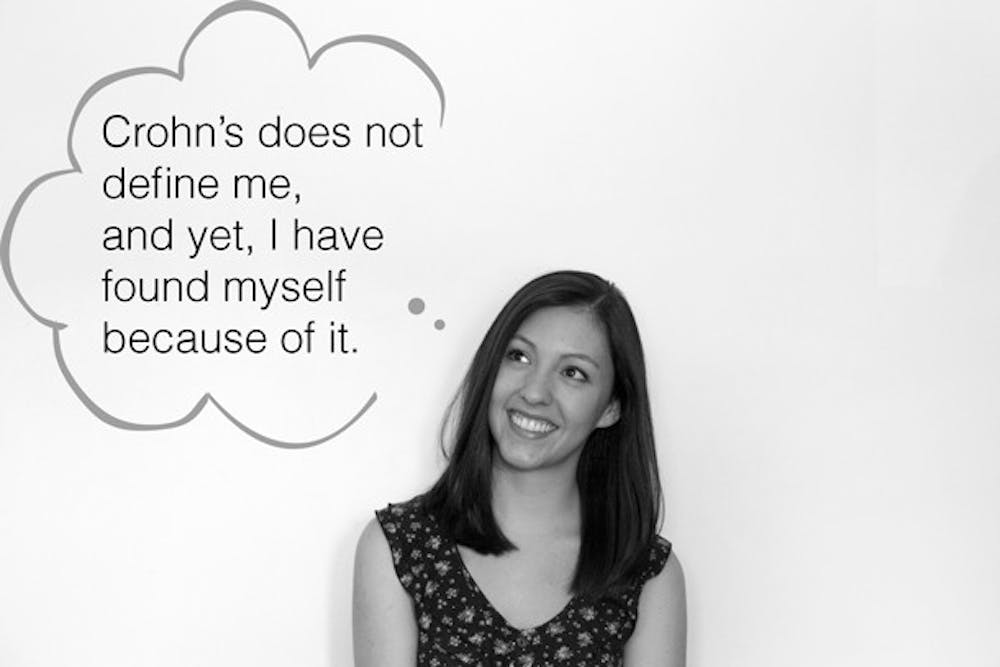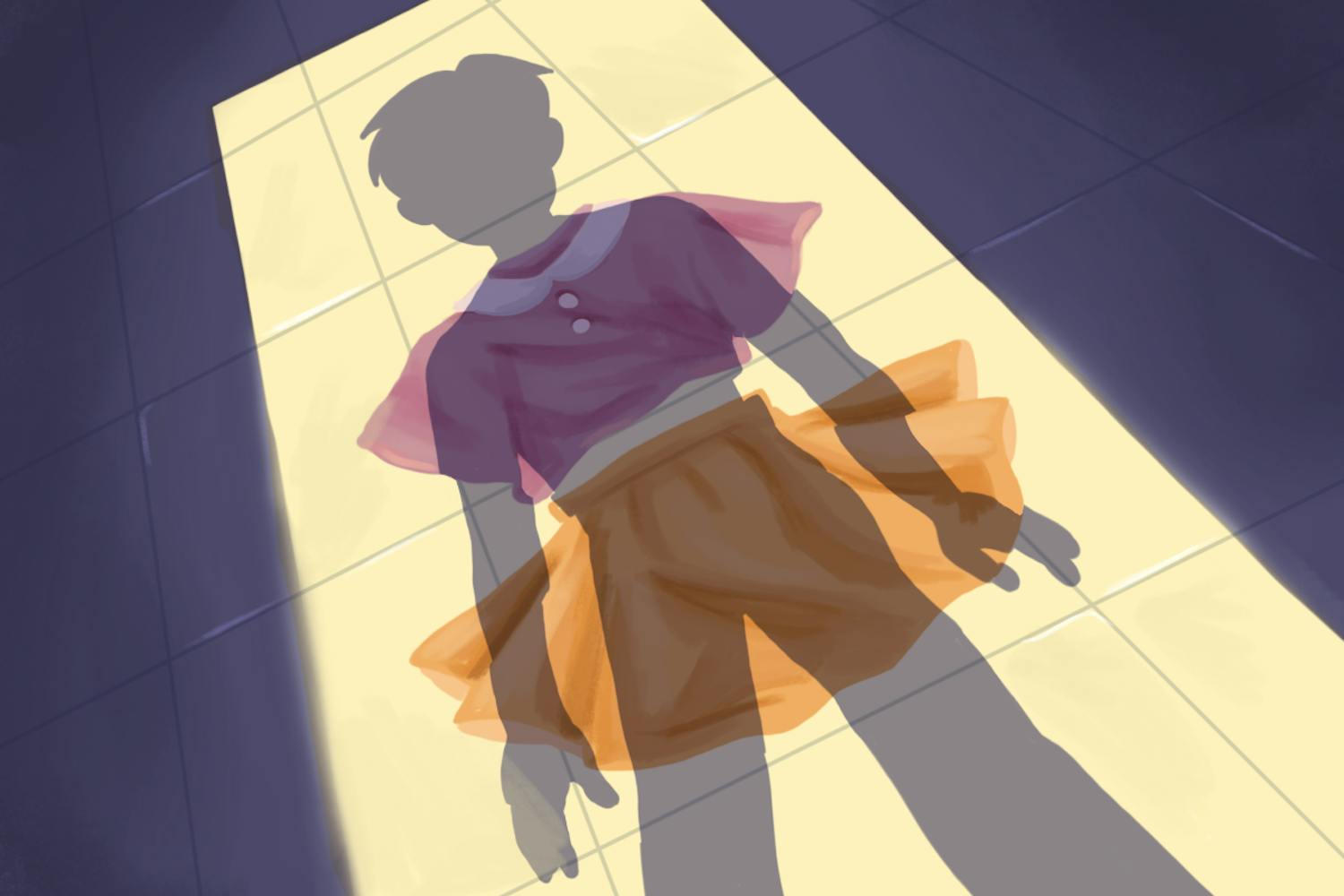 A Dual World: ASU student Brianna Procopio strives to be a nurse, while battling Crohn's.
A Dual World: ASU student Brianna Procopio strives to be a nurse, while battling Crohn's. Photo by Perla Farias
In a cramped 300-square foot dorm room, Brianna Procopio and Colleen Murphy lay on their blue, green and red carpet. Both twin beds were made. Photos of smiling teenaged girls and boys and a blanked with brightly colored fish swimming in the ocean looked down on the beds.
The ASU students live in the nursing residential community at Taylor Place Residential hall in Phoenix.
They don't live alone. They share their room with a “companion” – a five-foot plastic likeness of a human skeleton. They've used the skeleton to study human anatomy and physiology. On this day, with books, papers and a computer at hand, Brianna Procopio and Murphy took turns pointing at plastic knees, elbows and the ribcage. They quizzed each other on the tibia, then wrote down their answers in their notebooks. Brianna Procopio owns the skeleton. It's a symbol of her determination to become a nurse, despite her own health challenges.
*****
 Procopio says she tries to see the bigger picture when it comes to hardships in life and to instill what she's learned as a patient into her student life.
Procopio says she tries to see the bigger picture when it comes to hardships in life and to instill what she's learned as a patient into her student life. Photo by Noemi Gonzalez
Brianna Procopio is a tall 19-year-old with medium-length brown hair. She is quiet and often keeps to herself. Her surgical scars show when she wears tank tops and shorts.
Her passion for nursing stems from her own serious illness. She has Crohn’s Disease. She said she was diagnosed the summer before she started high school, when she was 15. Crohn’s Disease is an autoimmune disease causing inflammation in the lining of the digestive tract. There is no cure, but there are treatments to reduce the symptoms so patients can function well. Symptoms often include abdominal pain, diarrhea and blood in the stool. Many people who have Crohn’s say others do not want to talk or hear about it.
Brianna Procopio knows that with a chronic illness, becoming a nurse won’t be easy. Right now, she’s in remission and able to do many things that her peers do. At any point, she knows the Crohn’s could flare up. She could get sick again. Her plans could be derailed.
“I don’t know when it’s going to come back, because I know it will,” she says. “I have plans for my life. I used to plan and now I can’t. I’m afraid I’m going to have all of these plans and they’re going to fall through.”
 Procopio avoids certain social events and eating the junk food many students love. As a college student, this often means staying indoors.
Procopio avoids certain social events and eating the junk food many students love. As a college student, this often means staying indoors. Photo by Noemi Gonzalez
***
About 1.4 million Americans suffer from Crohn’s Disease and related illnesses. Crohn’s is slightly more common in females and is often diagnosed between the ages of 15 and 35.Crohn’s is a life-long disease that can have life-threatening complications. Those who have the disease need to be careful in many aspects of their lives, and that varies from person to person. Brianna Procopio says she sees a pediatric gastroenterologist at Cardon Children’s Medical Center, where she also receives outpatient treatments every eight weeks.
“Now that I am in remission, I can live like a normal college student and not worry too much about my symptoms,” Brianna Procopio says. She calls it "normal with modifications.”
For her, those modifications include not drinking or partying, getting sufficient sleep, eating healthy foods and staying away from the foods, like pizza, that cause her problems.
She says Crohn’s hasn’t been all that bad, now that she’s been diagnosed. In fact, it’s given her life direction. Ever since she was first hospitalized for a month after her initial diagnosis, she knew her path in life. She wanted to become a healthcare worker thanks to the positive impact of her hospital nurses.
She’s not alone. Fifty-eight percent of college students preparing for healthcare professions had a childhood illness or accident that prompted them to want to become healthcare professionals, according to a 2012 study by the Association of American Medical Colleges.
According to the study, this cohort – students with illnesses who have been positively influenced by their personal experience with healthcare workers – has been increasing slightly in the past several years.
“My disease is such a huge part of who I am today that I'd be absolutely lost without it. I wouldn't be the same person if I didn't have it,” she says.
*****
 Procopio embraces the scar left behind by the installation of her mediport, a tool used to infuse her blood with Crohn's medication through an intravenous drip feed (IV). Because Procopio says she bruises easily and has "bad veins," she says the mediport provides a better system.
Procopio embraces the scar left behind by the installation of her mediport, a tool used to infuse her blood with Crohn's medication through an intravenous drip feed (IV). Because Procopio says she bruises easily and has "bad veins," she says the mediport provides a better system. Photo by Perla Farias
In the days before she was diagnosed, Procopio suffered from severe Crohn’s symptoms. “It’s the most terrifying experience — being in a crowded place far from the bathroom and not knowing where they are,” Procopio recalled. “I just ran.”
“I remember the preceding summer, she would spend most of her time curled up in a ball on the couch because she was in excruciating abdominal pain,” says older sister Crista Procopio, a business student at ASU.
For months, Brianna Procopio visited a primary-care doctor who told her she had the flu or perhaps an eating disorder which was frustrating for the food lover. As the undiagnosed illness intensified, she didn’t like to leave the house, go out with friends to dinner or to the mall. She wanted to stay home, close to a bathroom. She was an incoming high-school freshman on the cheer team, and her behavior didn’t seem normal to her parents.
On a family trip to Disneyland, Brianna Procopio constantly ran bathroom. The trip was a family attempt to get her out of the house and back into a normal life. The drive home was a nightmare, with frequent bathroom stops.
After returning from the family trip, Brianna Procopio visited her doctor. Several nurses couldn’t get a needle into her vein to draw her blood and sent her to the emergency room. From there, she was admitted to the hospital. She had a CT scan and the emergency-room doctor said she might have Crohn’s.
“I remember smiling and thanking the doctor when she was diagnosed with Crohn's Disease, but not because I was happy about the illness,” Brianna Procopio’s mom, Karen Procopio, a high school teacher, says.
The family knew what they were up against. A close relative of Karen Procopio's has Crohn’s Disease and has been sick for much of his life.
Brianna Procopio was hospitalized for almost a month in August. She couldn’t eat, had lost 30 pounds and felt very weak, she recalls. She remembers how sunshine streamed through her hospital room window, shining on her stuffed animals and cards from classmates and cheer teammates.
At first, her hospital-room door had a NPO sign, which is Latin shorthand for “nothing by mouth.” Most of her nutrition came from total parenteral nutrition (TPN), administered through her IV. Eventually, she was allowed liquids and Crista brought her sister different flavors of slushies. As she began feeling better, she asked a nurse if she could start eating. The nurse jokingly wrote “will work for food” on that NPO sign.
Looking back on it, Brianna Procopio has good memories of the hospital. ChildLife specialists helped her cope with the challenges of her illness and filled up time with crafts and games and volunteers with therapy dogs.
During her hospitalization, Brianna Procopio met one of her heroes, a nurse, who inspired her decision to go into nursing. The nurse, Jamie Klimke, became her "absolute role model" because she took time to comfort her and treat her like a human being. Klimke and Brianna Procopio have kept in touch.
Brianna Procopio knows what it’s like to be the patient, which her family thinks will help her as a nurse. She understands what it’s like to be pricked with a needle or have to drink a laxative to prep for a colonoscopy. And while the doctors never seemed to have much time for her, the nurses, she said, made her hospital stay pleasant.
“She doesn't remember being so ill,” Karen Procopio says. “But I do, and for a long time, I had huge regrets. It's hard to think about this time in her life because I blame myself for not getting her help sooner.”
 Procopio says her mediport only shows during the summertime when she swaps her t-shirts for tanks. The mediport is implanted in the chest area with a catheter feeding into a cardiac vein in the neck.
Procopio says her mediport only shows during the summertime when she swaps her t-shirts for tanks. The mediport is implanted in the chest area with a catheter feeding into a cardiac vein in the neck. Photo by Perla Farias
*****
On a sunny Saturday afternoon in March, Brianna Procopio sits with three other Crohn’s patients around a table outside of a Starbucks in Tempe. Giggles fill the air as they discuss their bathroom habits, and the girls get some strange looks from people at other tables. Then the conversation gets serious.One girl had undergone surgery to have her colon removed, and until a second surgery reconnected her intestines, she wore a colostomy bag outside of her body.
“How was it having the bag?” Brianna Procopio asks.
“It wasn’t horrible, but I wouldn’t want it for the rest of my life,” Amara Babani says. “I was so skinny you wouldn’t have even known. I’d tuck it into my shorts or my pants.”
The women share photos of themselves, including one of Babani’s colostomy bag. They talk about their procedures, their diagnoses and telling friends about their illnesses.
“I don’t like telling new people because I never know what to say,” Brianna Procopio says.
“Or how they’ll react,” Babani says.
Brianna Procopio admitted she sometimes downplays her disease because she doesn't want people to "look at me differently."
“Right now, I’m fine, but then I could get sick,” she adds.
But she doesn’t let herself think about getting sick very much. She’s healthy now, focused on the future. And she’s determined to become a nurse.
 When talking about her disease, Procopio makes jokes, but on a serious note, says it has led her to understand who she is.
When talking about her disease, Procopio makes jokes, but on a serious note, says it has led her to understand who she is.Photo by Noemi Gonzalez




